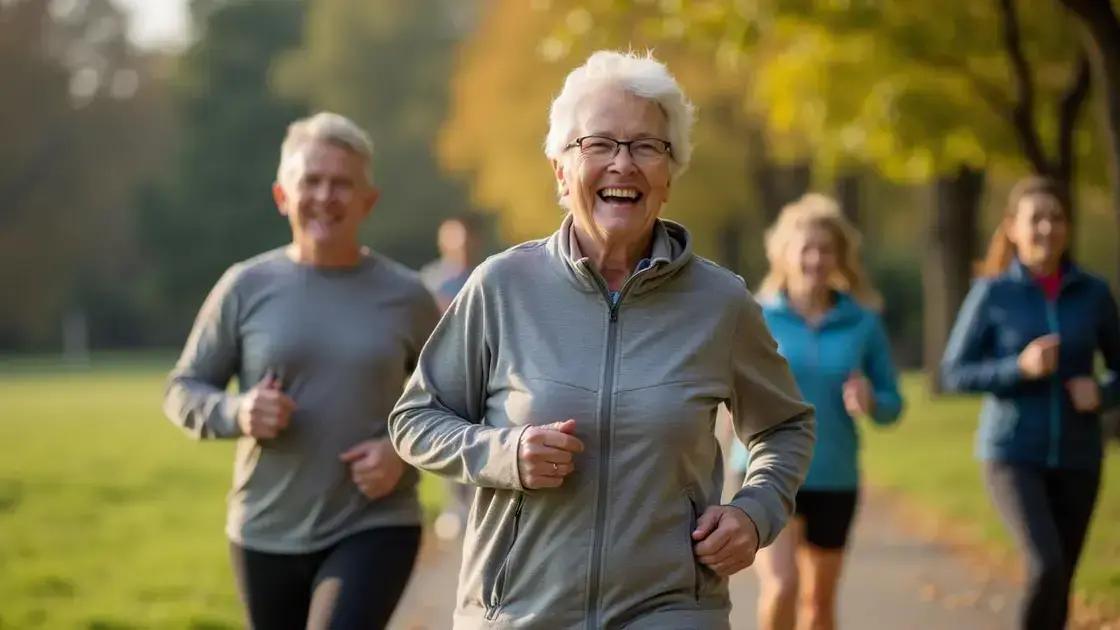Training for a 5K in your 50s can be fulfilling and healthy. To succeed, focus on understanding the benefits of running, setting realistic goals, following essential training tips for beginners, and prioritizing nutrition and recovery strategies specifically tailored for older adults.
Training for a 5K in your 50s can be an exciting challenge. As you embrace this new journey, understanding the unique benefits of running during this vibrant stage of life is crucial. Not only does running improve cardiovascular health, but it also boosts mental clarity and overall well-being. In this article, we will cover essential tips tailored specifically for those in their 50s, ensuring you set realistic goals, follow effective training methods, and prioritize proper nutrition for recovery to achieve your 5K dreams.
Understanding the Benefits of Running in Your 50s

Running in your 50s offers many physical and mental benefits. Engaging in regular running can help improve cardiovascular health, strengthen your muscles, and enhance your flexibility. By maintaining an active lifestyle, you can reduce the risk of chronic diseases such as heart disease, diabetes, and high blood pressure.
Improved Cardiovascular Health
One of the most significant advantages of running is the improvement in heart health. Running elevates your heart rate, promoting better blood circulation. This can lead to lower cholesterol levels and a reduced risk of heart-related issues.
Better Mental Well-being
Running has fantastic benefits for your mental health. As you run, your body releases endorphins, which can help combat feelings of stress, anxiety, and depression. Many runners report experiencing a “runner’s high”, where they feel euphoric and more positive about life.
Increased Longevity
Studies have shown that adults who engage in regular physical activity, like running, tend to live longer. The health benefits gained through running can lead to a healthier and more active lifestyle in your later years.
Enhanced Strength and Balance
As we age, maintaining strength and balance becomes crucial. Running helps improve your leg strength and balance, which can reduce the risk of falls. Incorporating strength training along with running can further benefit your overall stability.
Moreover, running can foster a sense of community, as often, older adults find joy in joining running clubs or groups. Engaging with others who share your interests can enhance the social aspect of fitness.
In summary, the benefits of running in your 50s are both powerful and encouraging. It can enhance your health, improve your mood, and increase your overall quality of life. Don’t let age deter you; it’s never too late to start.
Setting Realistic Goals for Your 5K Training

Setting realistic goals for your 5K training is essential for success, especially in your 50s. Start by assessing your current fitness level. Consider how often you currently exercise and if you have any past experience with running. This will help you create a solid starting point.
SMART Goals
Utilize the SMART goal framework to help you set effective goals. Ensure your goals are Specific, Measurable, Achievable, Relevant, and Time-bound. For instance, instead of saying “I want to run a 5K,” a SMART goal might be, “I want to run a 5K in 12 weeks, training three days a week, starting at a comfortable pace.”
Incremental Progress
Make sure to take your training slow. Focus on building up your distance and speed gradually. Consider starting with walking intervals. For example, you can begin by running for one minute and walking for four minutes, repeating this for 30 minutes. As you gain confidence and strength, gradually increase the running time and decrease the walking intervals.
Listen to Your Body
While pushing for your goals is important, it’s equally crucial to listen to your body. If you experience pain or exhaustion, take a step back. Adjust your training plan as needed and give yourself time to recover. Following a flexible training schedule can help you achieve your goals while maintaining your health.
Celebrate Small Wins
As you progress, celebrate small achievements. Every time you complete a training session or run a little longer, acknowledge your accomplishment. This positivity will help keep you motivated as your training continues.
By setting realistic and reachable goals for your 5K training, you will pave the path towards a successful and enjoyable experience. Keep your focus, and don’t rush the process!
Essential Training Tips for Beginners Over 50

Starting a running journey over 50 can be exciting and fulfilling. Here are some essential training tips to help you along the way.
Start Slow and Build Gradually
It’s important to ease into your training. Begin with walking or brisk walking, then gradually incorporate running. This will help your body adjust to the new activity.
Stay Hydrated
Hydration is crucial for all runners. Drink water before, during, and after your training sessions. Staying hydrated will help improve your performance and recovery.
Invest in Good Running Shoes
A proper pair of running shoes can make a huge difference. Look for shoes that offer support and cushioning specific to your foot type. A fitting at a specialized store can help you find the right pair.
Incorporate Strength Training
Adding strength training to your routine is essential. Exercises that focus on building muscle in your legs and core will improve your running efficiency. A few sessions a week can make a significant impact.
Listen to Your Body
Pay attention to how your body feels during and after training. If you feel pain or discomfort, rest and recover. It’s better to take a rest day than to push through and risk injury.
Find a Training Partner or Group
Having a training partner or joining a running group can provide motivation and support. It’s also a great way to make new friends who share your interests.
By following these essential training tips, you can embark on a running journey that is safe, enjoyable, and fulfilling.
Nutrition and Recovery Strategies for Older Runners

Nutrition and recovery are key elements for older runners striving to achieve their best. Focusing on these areas can make a significant difference in performance and overall well-being.
Eat a Balanced Diet
Maintaining a balanced diet is crucial for fueling your runs. Include plenty of whole foods like fruits, vegetables, whole grains, lean proteins, and healthy fats. These nutrients support your body during training and aid in recovery.
Focus on Protein Intake
Protein is essential for muscle repair and growth. Older adults need a bit more protein than younger individuals. Consider incorporating sources like chicken, fish, eggs, beans, and low-fat dairy into your meals.
Hydration is Key
Staying hydrated helps your body function at its best. Ensure you drink enough water throughout the day. During your runs, consider taking water breaks or using a hydration pack for longer sessions.
Pre- and Post-Run Nutrition
Eating the right foods before and after your runs can enhance your performance and recovery. Before running, have a small snack with carbohydrates and some protein, such as a banana with peanut butter. After your run, prioritize a meal that includes both protein and carbs to replenish your energy.
Consider Supplements Wisely
As we age, our bodies may need additional support. Speak with a healthcare provider to see if supplements like Vitamin D, Omega-3 fatty acids, or Calcium might be beneficial for you. However, strive to meet your nutritional needs through food first.
Rest and Recovery
Don’t overlook the importance of rest. Ensure you schedule rest days into your training plan to allow your muscles to recover. Use these days for light activities like walking or yoga to maintain mobility without overstraining your body.
By prioritizing nutrition and recovery, older runners can enjoy a productive training journey and remain active well into their years.
Unlock Your Potential with Running
Training for a 5K in your 50s is not just about the finish line; it’s about improving your health, embracing new challenges, and enjoying the journey. By understanding the benefits of running, setting realistic goals, following essential training tips, and prioritizing nutrition and recovery, you can enhance both your running experience and overall well-being.
As you embark on this exciting path, remember to listen to your body and celebrate each milestone. With dedication and the right strategies, you can unlock your potential and achieve great things, proving that age is just a number when it comes to living an active and fulfilling life.
So lace up your running shoes and start this inspiring journey today!
FAQ – Frequently Asked Questions About Training for a 5K in Your 50s
What are the benefits of running in my 50s?
Running in your 50s can improve cardiovascular health, boost mental well-being, increase longevity, and enhance strength and balance.
How do I set realistic goals for my 5K training?
Utilize the SMART goal framework. Set specific, measurable, achievable, relevant, and time-bound goals based on your current fitness level.
What are some essential training tips for beginners over 50?
Start slow, stay hydrated, invest in good running shoes, incorporate strength training, listen to your body, and find a training partner or group.
How should I approach nutrition as an older runner?
Focus on a balanced diet rich in whole foods, protein intake for muscle repair, proper hydration, and pre- and post-run nutrition to boost energy.
What recovery strategies are important for older runners?
Prioritize rest days, listen to your body, and consider light activities on rest days to aid recovery while maintaining mobility.
Is it too late for someone in their 50s to start running?
No, it’s never too late! Many people in their 50s enjoy running and achieve great success by training smart and staying committed.













